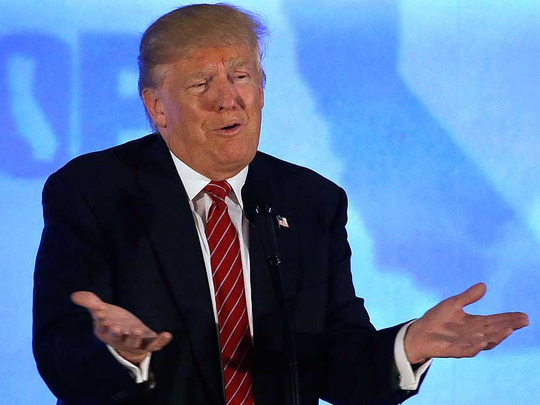
US Republican presidential contender Donald Trump vaguely outlined his foreign policy last week, promising to put “America first” and igniting a firestorm of media debate around his worldview.
In a scathing editorial, the USA Today compared the GOP frontrunner’s speech to reality television and said that in Trump’s world, “things happen because he says they will.”
“As with The Apprentice, the show that helped him become a household name, the Republican front-runner sought to provide appealing fare for a certain class of people. In this case, the primary audience was voters opposed to trade, resentful of immigrants, distrustful of foreign governments, and wistful for a time when America wielded more power in a simpler world. In reaching out to this group, Trump vividly portrayed a world that does not exist: America’s allies would be more respectful after being lectured to, while its enemies would be dealt with by bluster. China would fall into line after enduring unspecified economic pressure. And troubled regions of the world would be stabilised through US disengagement,” the paper said.
The New York Times took a similarly caustic and critical stand, though it appreciated the semblance of thought put forth by the real estate tycoon.
“After landslide Republican primary victories, Donald Trump delivered a speech in Washington intended to clarify his foreign policy positions,” it said in an editorial, adding: “That was needed, because his views on America’s role in the world have until now been expressed in tweets, interviews and remarks at rallies that have alarmed nearly every foreign ally of the United States. No one’s fears are likely to be allayed by this speech, which was clearly worked up by his new campaign advisers and read from a teleprompter. It did not exhibit much grasp of the complexity of the world, understanding of the balance or exercise of power, or even a careful reading of history.”
The paper then went on to list why Trump would not make an ideal US president: “When one has a hammer, everything looks like a nail. And when one’s experience is limited to real estate deals, everything looks like a lease negotiation. Hearing Trump describe his approach to foreign relations, one imagines a group of nations sitting at a table with him at its head, with him demanding more money, more troops and policy changes in exchange for American protection, trade and friendship…. Trump did not display any willingness to learn or to correct his past errors. For someone who claims he is ready to lead the free world, that is inexcusable.”
The Washington Post examined in closer details the so-called facts peddled by Trump in his speech.
“What was supposed to be a rare set-piece speech by Donald Trump on foreign policy resembled a pastiche of his off-the-cuff postulations from the campaign trail, cobbled together under the slogan “America First.” Like the previous rhetoric, his proposals were loose, frequently contradictory and embedded in a bucket of falsehoods. Of these, the biggest was Trump’s claim that he could somehow reverse the historical tides that have created a globalised economy and remedy the complex security challenges of the 21st century with a simple ‘plan for victory with a capital V.’ Those weren’t the only contradictions. Trump said the United States had ‘no choice’ but to abandon defence commitments to allies because of the allegedly weakened state of the US economy. But minutes later the candidate was lamenting the shrinkage in the US armed forces and declaring, ‘We will spend what we need to rebuild our military. It is the cheapest single investment we can make’.”
The Guardian meanwhile delved into the ideological crisis that has gripped the Republicans and has enabled Trump to emerge as the presidential front-runner, at the cost of worldwide alarm.
“Trump’s drive towards winning the nomination has been fundamentally based on racial politics that ought to have had no place in the party of Abraham Lincoln. But the modern history of the Republican party has gone a long way to disarm its ability to make such a stand when it mattered. The party has long allowed itself to become predominantly a party of and for white Americans. Intermittent past attempts to reach out to minority voters, for instance under George W Bush, have not been carried forward, but pushed back. The upshot is a party that, even if it does not have Trump as its nominee, will struggle to unite around someone who can reach out to an increasingly diverse US electorate,” the paper said in an editorial.





_resources1_16a31069e4e_small.jpg)





